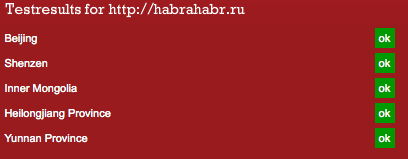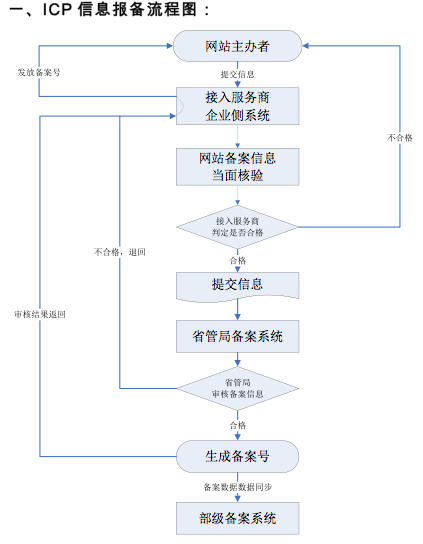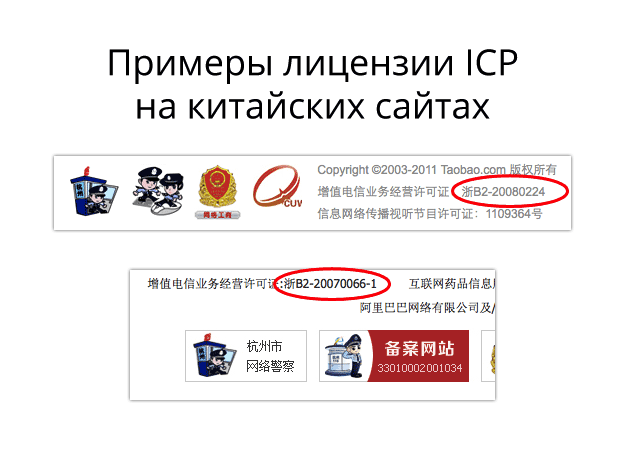Buying a hosting in China: why is it necessary and how difficult is it

Today I want to tell dear Habr 客 about buying a Chinese hosting, servers, a special license for Internet activities, censorship in China. And even a few words about the clouds I have.
What is hosting in China for?
To begin with, let's take a logical question: why put a site in China? Here are the main reasons for this:
1. Slow loading site
Fact of the day: in China, foreign sites open very slowly. If Chinese sites, which sometimes can weigh up to 50 megabytes due to uncompressed pictures and flash, open in a couple of seconds, then all foreign sites load extremely, very slowly here. Slightly faster loading sites that are located in Hong Kong, Korea, Japan and Singapore (more about them below). Reasons: features of the Chinese Internet structure and intentional restriction of the channel for foreign traffic.
Therefore, if you want your site to open quickly for the people of China, place it in China.
2. Bad SEO Impact
Baidu, as well as Google, evaluate the site’s accessibility and speed of its response (ping), which is taken into account when ranking in search results. And if the site is abroad = poor accessibility = poor indexing and far in the search results.
3. The constant risk of being blocked in China

If in Russia people are just starting to get used to the Black List of Roskomnadzor sites, then in China they have been living with this since the advent of the Internet. However, over time, all sites that have not received an ICP license are on the informal gray list and are at constant risk of being blocked in China. It must be said that the Chinese are blocking sites indiscriminately, sometimes immediately by IP address. And this means that if your site is on shared hosting (where thousands of other resources can also be located), then one “intruder site” on this IP can cause the blocking of all the others.
Services for checking the availability of your site in China
- www.greatfirewallofchina.org
- viewdns.info/chinesefirewall/
- www.websitepulse.com
- www.just-ping.com
Breaking the rules and getting banned on the Chinese Internet is not very difficult. Sometimes an unsuccessful combination of words on one page (especially in Chinese or English) can cause a block.
To avoid blocking a site in China
1. Use a VPS or a dedicated server with a unique IP.
2. Avoid publishing political material. Especially in Chinese and English (I think it’s not worth specifying that the publication of anti-state, illegal and other materials is a 100% ban).
3. Avoid publishing “sensitive” materials (for example, mentioning the names of some officials on the Internet is an instant ban).
4. Do not post porn or gambling related content.
How to buy hosting in China?
Buying a hosting or renting a server in China is no more difficult than doing it abroad. Look for Chinese hosting companies on Google or Baidu, or go directly to the Chinese RU-CENTER counterpart - WWW.NET.CN (中国 万 网). I will not talk about hosting prices: they are different and are not the subject of this article.
The only and main problem you will encounter is obtaining an ICP license. In short: if you buy a hosting / server in China, you should definitely get one. You can register and pay for hosting, but the site will not open until you provide the ICP number. However, some hosting companies may offer three to five-day access for test work without a license.
HabraHelp: What is an ICP license?
The ICP license is a permit issued by the Ministry of Industry and Informatization of the PRC, which gives websites the right to officially operate in China. ICP license numbers can be found in the basement of most Chinese sites.
ICP license is required for: (a) registering a site in the .cn zone; (b) purchases of hosting / servers in China; (c) participation in the Baidu advertising network; (d) conducting legal Internet business in China.
ICP license is NOT needed for sites located on foreign servers (BUT! .Com site located in China must be licensed).
You can be exempted in two cases:
- The domain is not used for the site (it happens sometimes).
- The domain is used on a site that is located on a server abroad.
However, in both cases, you must submit the appropriate application through the site.
How to get an ICP license in China and how much does it cost?

Brief instructions on obtaining an ICP license
The license itself is free, but the conditions that you must meet can cost you a lot of money. Registration is carried out at www.miibeian.gov.cn or through the website of the hosting company. It includes confirmation of the email address, cell phone, as well as sending documents proving your identity and legal status of your company (are you a simple or online company? Do you have an ecommerce license? Does the type of company correspond to the registered capital?) .
If you do not have a Chinese legal entity, then there are partnership options with local companies specifically for buying hosting in China. And if you are lucky and you are a Chinese citizen, then you can get a personal license under which selling something on the Internet is not entirely legal.
Alternative to hosting in China
If you do not have the opportunity to host your site in China, then I recommend looking at the closest Asian countries: South Korea, Japan, Taiwan, Singapore and Hong Kong. The speed of connection with these countries is much faster compared to other countries. Nevertheless, my experience shows that such options are still inferior in speed and indexation to sites that are located in China. But as a temporary option - completely.
A few words about the clouds
I don’t have much to say about Chinese cloud hosting. You will again need an ICP license to use them. Of the notable players in this market (Amazon Web Services analogues): AliYun (from Internet giant Alibaba / Taobao), Baidu.Yun and Giant Cloud .
***
As always, I look forward to your comments, additions and questions.

